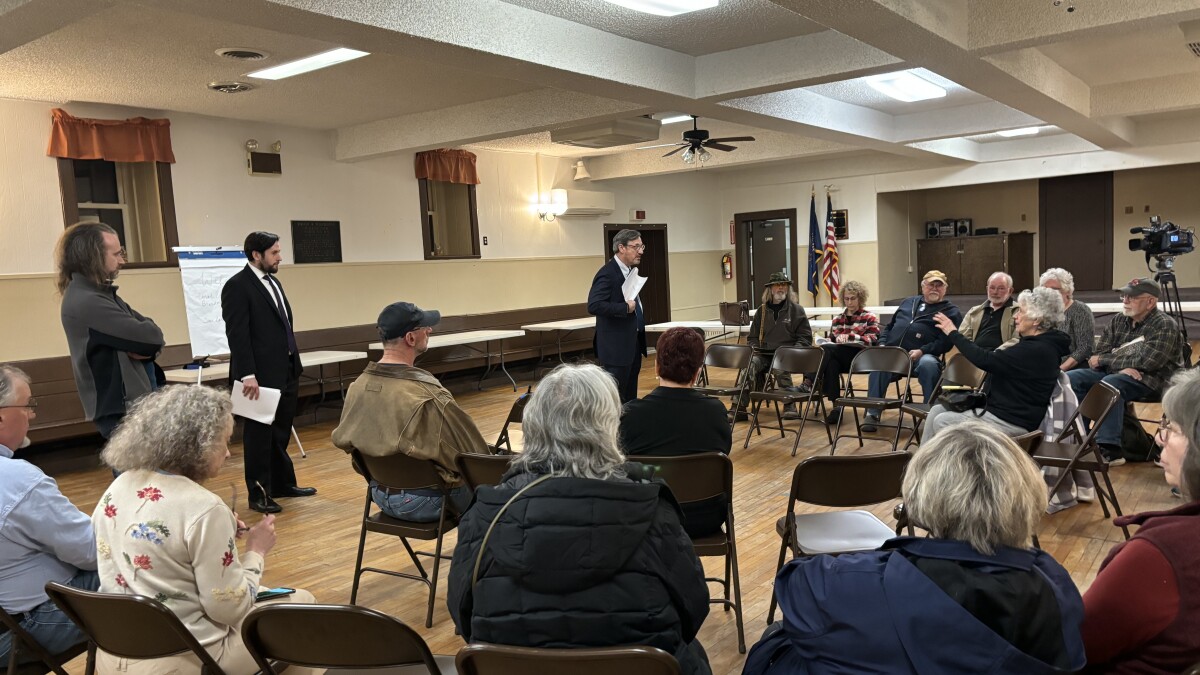
Save Carbon County, a grassroots environmental organization, sued a cryptocurrency plant and Governor Josh Shapiro this week.
The organization alleges Panther Creek Electric Generating Facility and its parent company, Stronghold Digital Mining, pollute the environment with the Shapiro Administration’s support. Stronghold received over $29 million in tax credits from the state over the last two years, according to the lawsuit.
Aaron Freiwald, Save Carbon’s attorney, told taxpayers at a community meeting on March 26 that they have unknowingly paid for Stronghold to exploit them and the environment.
“We’re all paying the costs for these guys to do what they’re doing and walk off back to their wealthy investors with a new Bitcoin,” said Freiwald.
Stronghold’s public relations consultant sent WVIA a statement “attributable to a Stronghold spokesperson” about the lawsuit. Jordon Qureshi from 150Bond emailed their response.
“We are analyzing the lawsuit but adamantly deny any wrongdoing. Our record of cleaning up land and water in the Commonwealth speaks for itself. Without purpose-built, emission-controlled, reclamation and power facilities like Panther Creek, waste coal would sit dormant and continue to cause environmental harm. Stronghold’s facilities have cleaned up millions of tons of waste coal and reclaimed over 1,050 acres of once-blighted land, now sports fields, parks, and fishing spots for local communities. We are proud to clean up substantial piles of waste coal that have long devastated Pennsylvania.”
Freiwald Law approached Save Carbon at a hearing in December to make them the plaintiff. The lawsuit names Panther Creek, Stronghold, Shapiro, the Pennsylvania Department of Environmental Protection, Interim DEP Secretary Jessica Shirley, the PA Public Utility Commission, and the Commonwealth as defendants. Attorney Freiwald said he could not remember a case where “right and wrong” were as “clear.”
“You have a lot of people in this community who have been raising their voices for a long time about what they deal with everyday. That school that’s near the plant. The home that’s getting showered with debris from this plant. The resident who lives near to this power plant that has to listen to the noise of these thousands of computers day and night,” said Freiwald. “They’ve been raising their voices, and their elected officials are not helping.”
Around twenty residents came to the lawsuit meeting. Save Carbon’s president, Linda Christman, said many feel defeated. She hopes this lawsuit will change that.
“It has felt very hopeless,” said Christman. “Because, you can tell that DEP – they’ve already given a preliminary permit. When they held the public hearing they said, ‘This is to discuss approving the permit. Not if it should be approved…Y’know, everybody has been just banging their heads against closed doors.”
That DEP hearing was for a permit to allow Panther Creek to expand its cryptocurrency mining operations. It currently burns waste coal, but wants to add tire burning to the mix. The permit would allow it to use tire-derived fuel (TDF) to supplement 15 percent of its monthly electricity use by weight.
Cryptocurrency mining requires a lot of energy. Computers race against each other to solve block chains, which are lines of code. They “guess” the code to solve the block and get more Bitcoin. According to the lawsuit, Stronghold’s yearly electric use is equal to that of 1.15 million homes per year. Their data comes from the U.S. Environmental Protection Agency (EPA).
The lawsuit also demands for Stronghold to pay monetary damages to nearby residents. Freiwald Law cites Stronghold’s current emissions at Panther Creek, which are four times the amount of emissions at Panther Creek pre-2020, before Stronghold acquired the property. That data also comes from the EPA.
Residents and lawyers at this week’s meeting cited eight publicized air quality violations about Panther Creek that can be found on DEP’s page on the tire permit application. Those violations, including seven violations from Scrubgrass Plant, which also owned by Stronghold, total to 15 air quality violations since 2018.
However, Panther Creek alone has had 16 air quality violations since 2018. Fourteen of those violations are for not doing air quality tests. DEP’s files, which are available to the public but are not found on the application page, show that Panther Creek has twelve unresolved air quality violations. That data comes from the DEP’s eFACTS page. The first dates back to Oct. 2018.
The DEP could not be reached for a response on the discrepancy.

